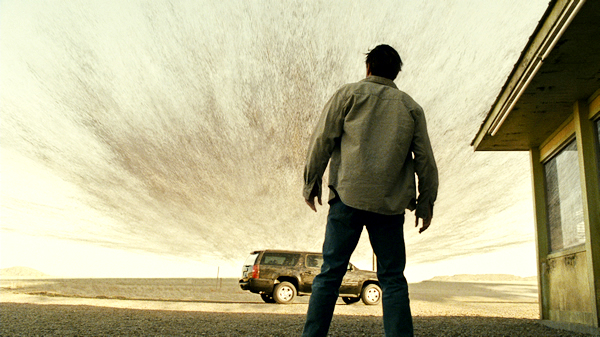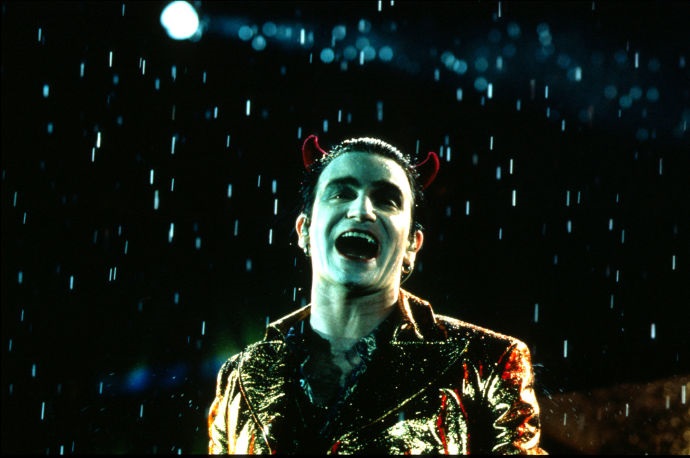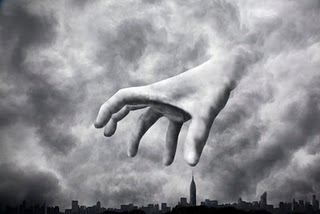
(With
all apologies to Father McGruder.) Yes, y’all, the End of Days has come. There is a hole in the sky. John Cusack is off
floating on his ark. Hobo Viggo and son are
somewhere on I-95, “carrying the fire.” And, for their part, bad-ass evangelist Denzel Washington is apparently the last Jehovah’s Witness on Earth, and the fallen angel Paul Bettany is trying to take his broken wings and learn to fly again. (Did you know that
every time a bell rings, an angel is shooting somebody in the face?)
In any event, I saw Allen and Albert Hughes’ The Book of Eli and Scott Stewart’s Legion on subsequent weekends (with another vaguely religious-themed movie in between, which I’ll get to in a bit), and they seem like they merit discussing together. Both are post-apocalyptic B-movies, and, weirdly enough, that’s B as in Bible: Both use Judeo-Christian themes as a pretext for ninety minutes or so of Matrix-y ass-kicking. And neither are as smart, entertaining or satisfying in their B-movieness as the Spierig’s recent Daybreakers. Of the two, Legion probably comes closer to finding that popcorn movie groove, just because it makes no bones about being unabashedly dumb — but it too slips off the rails in the final half-hour.
More on that in a bit. Let’s take the Hughes’ Book of Eli first. I should start by saying that I’m glad to see the Hughes brothers making a movie again, although I wish it was one a good deal better than this goofy drek. Their assured, eminently quotable 1993 debut Menace II Society is one of my favorite films of the nineties, and in a perfect world it should have gotten all the many props that went to John Singleton’s more Hollywood’y Boyz n the Hood of 1991. (“Now O-Dog was America’s worst nightmare: Young, black, and don’t give a f**k.“) And their take on From Hell in 2001 was laudably strange and decently compelling — It’s definitely not the worst Alan Moore adaptation out there, by a long shot.
To their credit, the Hughes give this post-apocalyptic America a bleached-out, Big Sky look that’s eye-catching…for the first half-hour of so. (After awhile, there get to be way too many slo-mo hero shots of Denzel and his eventual protege, Mila Kunis.) And, during that opening half-hour, it seems like Book of Eli might make for a pretty solid spaghetti western or samurai flick. There are two kinetic six-or-seven-on-one melees in particular, wherein a motley assortment of Borderlands-style goons and Mad Max castoffs meet the business end of Denzel’s machete, that suggest The Book of Eli will make for a pretty fun B-movie ride.
But then it all starts falling apart, mainly as a result of terrible writing. For it soon becomes clear that Denzel, a.k.a. Eli, is attracting attention in this World Gone Wrong because he is carrying — I kid you not — the Last King James Bible on Earth. Yes, somehow — only thirty years after the nukes fell — every single bible out of every single house, apartment, bookstore, mega-mart, and motel room on the planet has been destroyed…but one. This is apparently, it is said, because the survivors blamed the Bible for the End Times coming and destroyed them all. How the few remaining survivors managed to relay this message all around the world after communications had stopped is left unexplained. Nor do they show the poor irradiated schmoes who were forced to wander from burnt-out church to broken-down motel over those thirty years, scouring the Earth for the estimated 7.5 billion copies of the world’s most reproduced book. And they only missed one!
But that’s not all. So, Denzel is toting around that last Good Book, and the Big Bad of the local Bartertown — Gary Oldman — wants its immense persuasive power for his own. I forget the exact wording, but he does some monologuing to the effect of: Only with that bible in my possession will I have the words to exert my domination over the remnants of humankind! So, in other words, if he gets the Book under his thrall, Oldman will be the new prophet-king of social control. To which I say…huh? First off, at the risk of offending certain readers’ religious sensibilities — move along, Tom Cruise — hasn’t Oldman’s character ever heard of L. Ron Hubbard or Dianetics? (Or seen Zardoz, for that matter?) If you want to set up a new religion with yourself at its center, you don’t really need a KJV bible to do it. Second, it’s made abundantly clear that Oldman knows the bible pretty well from his early days anyway. He can’t just…wing it? How much more would you need other than the stories, which everybody knows, and a few choice excerpts like the Lord’s Prayer?
Not to give the game away, but The Book of Eli also suffers from a truly dumb Shyamalan ending which I will not disclose here. (Suffice to say, A Clockwork Orange notwithstanding, Malcolm McDowell showing up in the late going of any film isn’t usually a mark of quality. And if you really want to know the final turn, I’ll give a hint in spoiler-vision: “What do Rutger Hauer and Zhang Ziyi have in common?“) Now, to be fair to The Book of Eli (and as an AICN commenter pointed out), a lot of sci-fi and fantasy B-movies have plot devices that make it hard to sustain disbelief — time-traveling robots from the future, for example. True, Eli‘s central conceit is roughly similar to the plot of the very good A Canticle for Leibowitz (although that book takes place centuries after the nuclear holocaust, and the Catholic priests involved aren’t trying to preserve the Bible per se.) And, even the next movie I’m about to discuss makes less sense up front than Book of Eli‘s goofy “all the Bibles are gone!” schtick.
The difference is, in those other movies (Legion aside), once you accept the premise that robots can time-travel, Earth is now populated by damn dirty apes, vampires have taken over or whathaveyou, the rest of the story makes decent sense in that world, and is pretty darned entertaining to boot. The Book of Eli…not so much. For one, Denzel’s character is too superhuman throughout — After the first few fracases, there’s no sense at all that he ever might be in danger. More problematically, perhaps realizing that fundamental problem, the screenwriter (Gary Whitta) instead decides to punctuate pretty much every scene with women in sexual peril, a decision which is supremely lazy and, after awhile, borderline misogynistic. (Were you to play a drinking game involving one beverage for every time Mila Kunis, Jennifer Beals, or any other woman in The Book of Eli is threatened with rape or violence, or those threats are acted upon, you may just end up drunk enough to stop wondering what the hell is wrong with Gary Whitta.)
Anyway, all that aside, there are a few small glimmers of entertainment here and there in the later going, although they’re mostly meta moments: Michael Gambon and Frances De La Tour escape Hogwarts long enough to show up as gun-totin’ redneck cannibals, and both play it like they’re on some kind of dare. And Dracula does get to share another scene with his Renfeld, the inimitable Tom Waits. (Oldman and Washington are professionals anyway — neither condescend to this lousy material.) In the end, though, The Book of Eli is a bad movie with a dumb premise that doesn’t even seem to understand how bad or dumb it is. And that ultimately just makes it worse.

Now
Scott Stewart’s Legion, on the other hand, wears its B-movie badness like a badge of honor, and that gets some points from me. I mean, Dennis Quaid and Charles Dutton as two short-order cooks, fending off demons in their middle-of-nowhere diner (in a place called Paradise Falls, no less)? These guys are hardened veterans of this sort of thing. They know the score, and they help bring the right sense of proportion to the rest of the survivors, including Adrianne Palicki, Tyrese, Kate Walsh, Willa Holland, and the underrated Lucas Black (who, on
Sling Blade alone, really should’ve played Jake Lloyd’s part in
The Phantom Menace.) In every scene they’re in, Quaid and Dutton manage to wordlessly convey their understanding that: Look at best, we’re making
Tremors here, people.
In Legion, the End of Days wasn’t a man-made screw-up this time. Rather, in a fit of Old Testament wrath, our Father who art in Heaven decides that the whole mankind experiment has totally and utterly failed (maybe He caught wind of the whole reality-TV thing) and thus sends down a few plagues — locusts, angels, and whatnot — to smote us all into oblivion. Fortunately for us, the archangel Michael (Paul Bettany) isn’t down with the new program, and so he clips his wings, dons some choice duds and a ridiculous amount of firepower, and becomes humankind’s protector, or at least the protector of an unborn child that apparently will be some kind of second Messiah. (Think John Connor, but biblical.) And if he can save a few diner patrons while he’s at it, well the more the merrier.
So, in other words, if The Book of Eli was a post-apocalyptic western — a Stranger comes to Town and all that — Legion is really more of a zombie movie. It’s a bunch of random strangers thrown together by crisis, trying to survive against impossible supernatural odds without killing each other. Or, in other words, it’s The Prophecy meets Night of the Living Dead meets The Terminator meets Assault on Precinct 13. (At times, it also feels a lot like the considerably better Prince of Darkness, but without Alice Cooper around to play the possessed folk.) And, even more than with Eli, I vibed into its flagrant b-movieness for the first hour or so of its run.
The problem is, Stewart and co-writer Peter Schink don’t really seem to know where they want to take this thing. You know that old saw about throwing a bunch of characters together in a room and pretty soon they start to write themselves? Well, if Legion is any indication, sometimes they don’t. And so the movie starts to lose its early head of B-movie steam by the middle going, as the various survivors pair off and spin their wheels with “character-building” conversations that go nowhere. There are a few funny exchanges, most of which made it into the ubiquitous trailer. (“I don’t even believe in God!” “That’s ok, He doesn’t believe in you either.“) But even more than in most of these flicks, I found myself sitting around waiting for the next attack just to get things moving once more.
And that brings us to the other big problem. The ground rules here don’t make a whole lot of sense. So these zombies are angels? Clearly, gunfire cuts through them like butter, so they don’t seem any different from, you know, zombies. And why are they attacking in waves like this? What’s the plan here? I know the Lord works in mysterious ways, but…is He really one for acid-drenched booby traps? Schink and Stewart have one clever conceit here — that the most innocuous-looking people around are the ones you’ll really need to worry about to go bugnuts evil at the drop of a hat. But they just keep reusing it. When an old lady attacks (again, as per the trailer), it’s a clever reversal of expectations. But when little kids and the ice cream man later do the same, it all gets a bit redundant.
By the time the archangel Gabriel (Kevin Durand, seeming, in all honesty, pretty straight-to-video) shows up in the last half-hour, Legion just gives up any pretense of coherence. I can barely explain anything that happens after the remaining few souls scramble out of the diner, other than to say it really isn’t worth trying to explain anyway. To its credit, Legion may not suffer from the dreary self-seriousness of The Book of Eli, but the last reel is just as convoluted and nonsensical. And, as such, both movies end up feeling a bit like the lurid daydreams of an ADD-afflicted teenager, one who’s fallen asleep after way too much Red Bull, Bible Study, and Modern Warfare 2. It’s time to wrap this up, so if you’ll forgive a really terrible pun: Lacking conviction and passionate intensity, sadly, neither of these flicks are worth a second coming.











